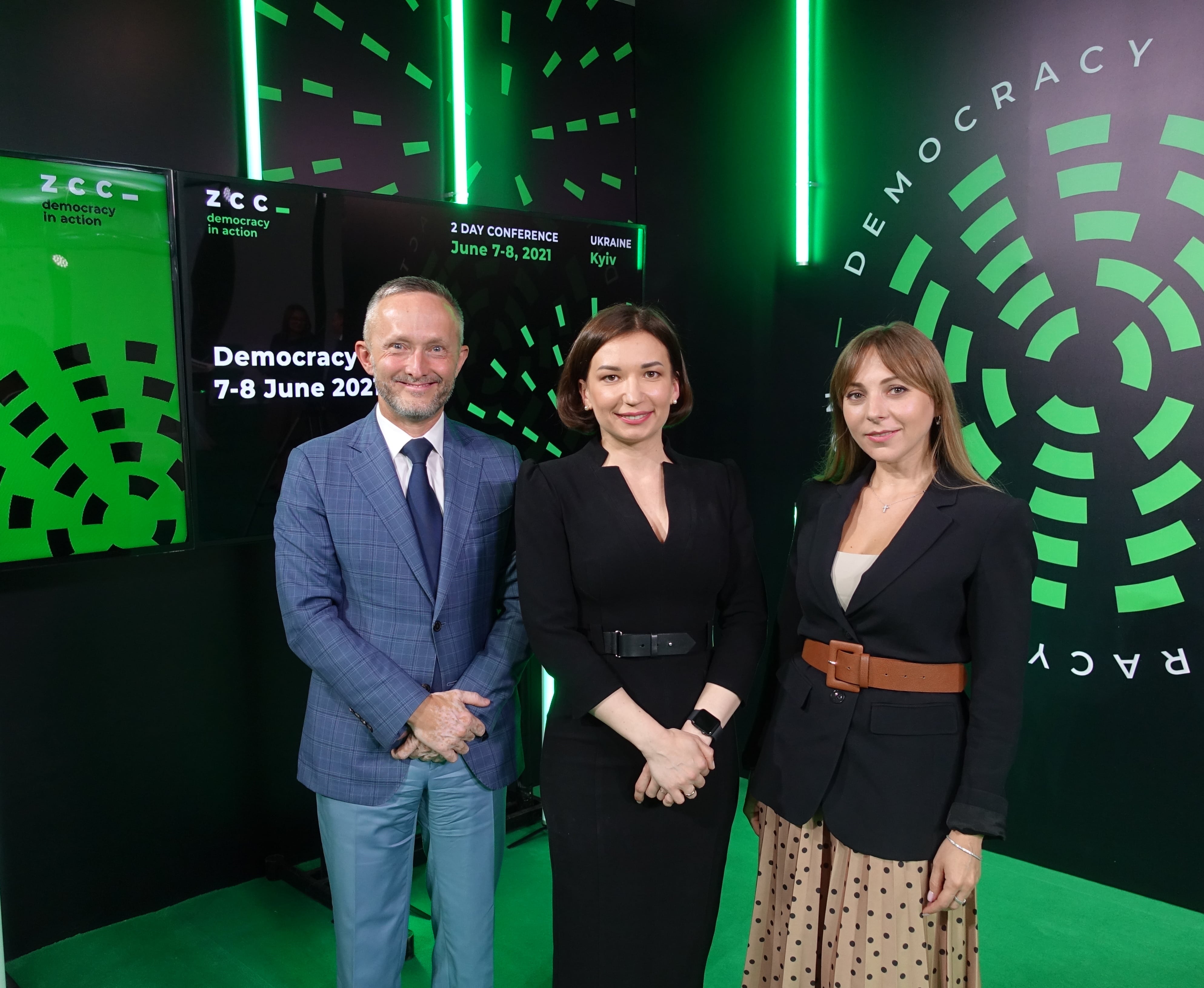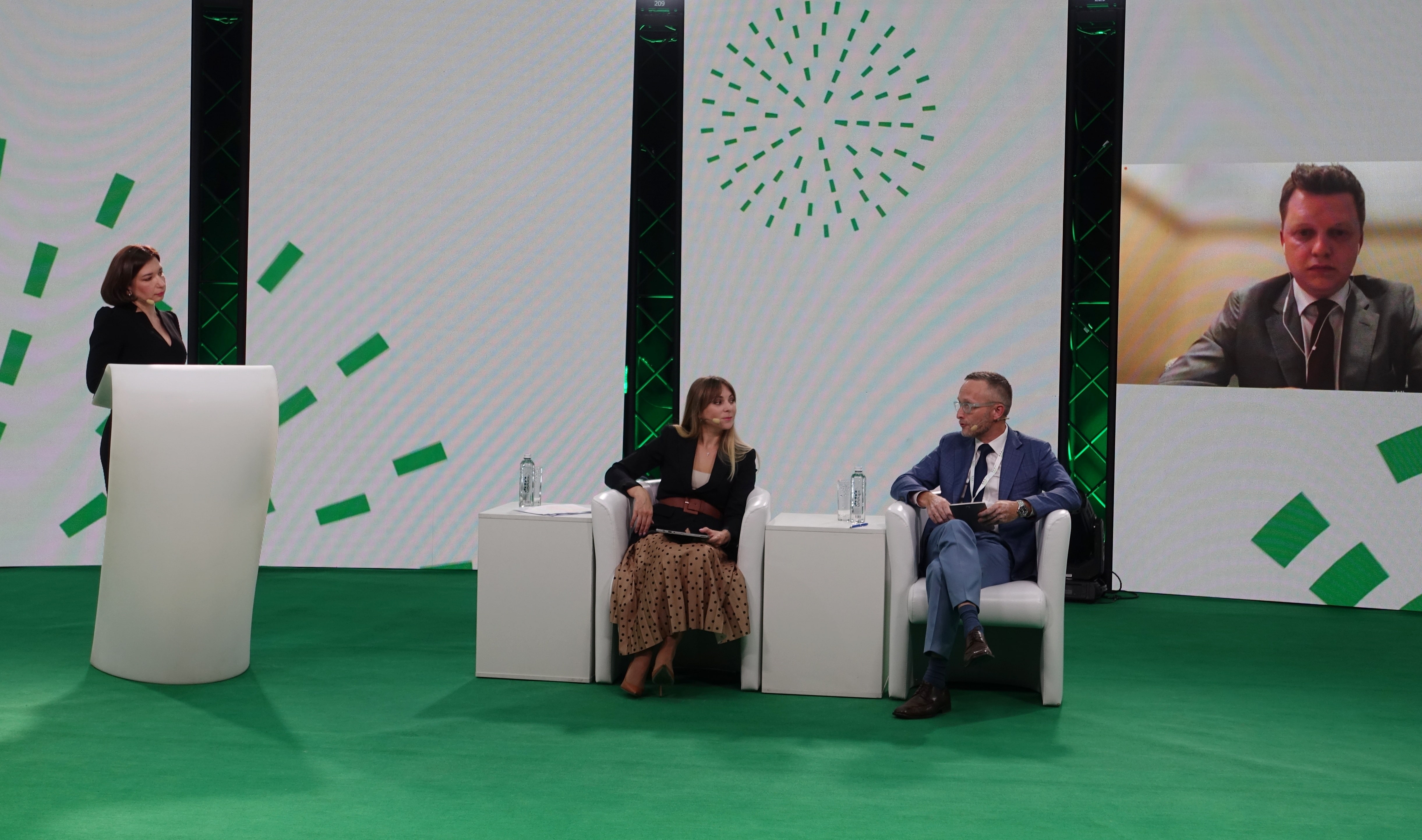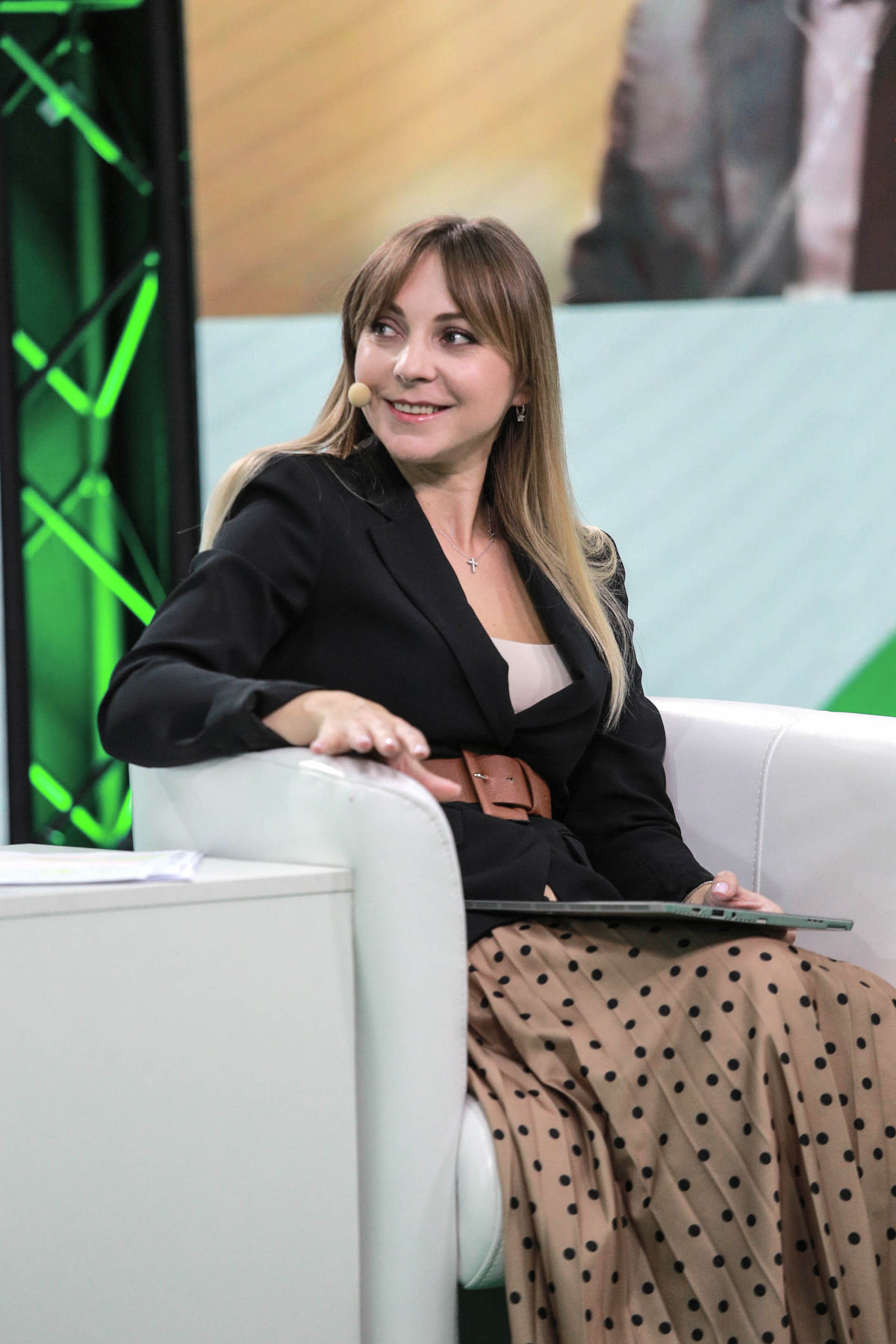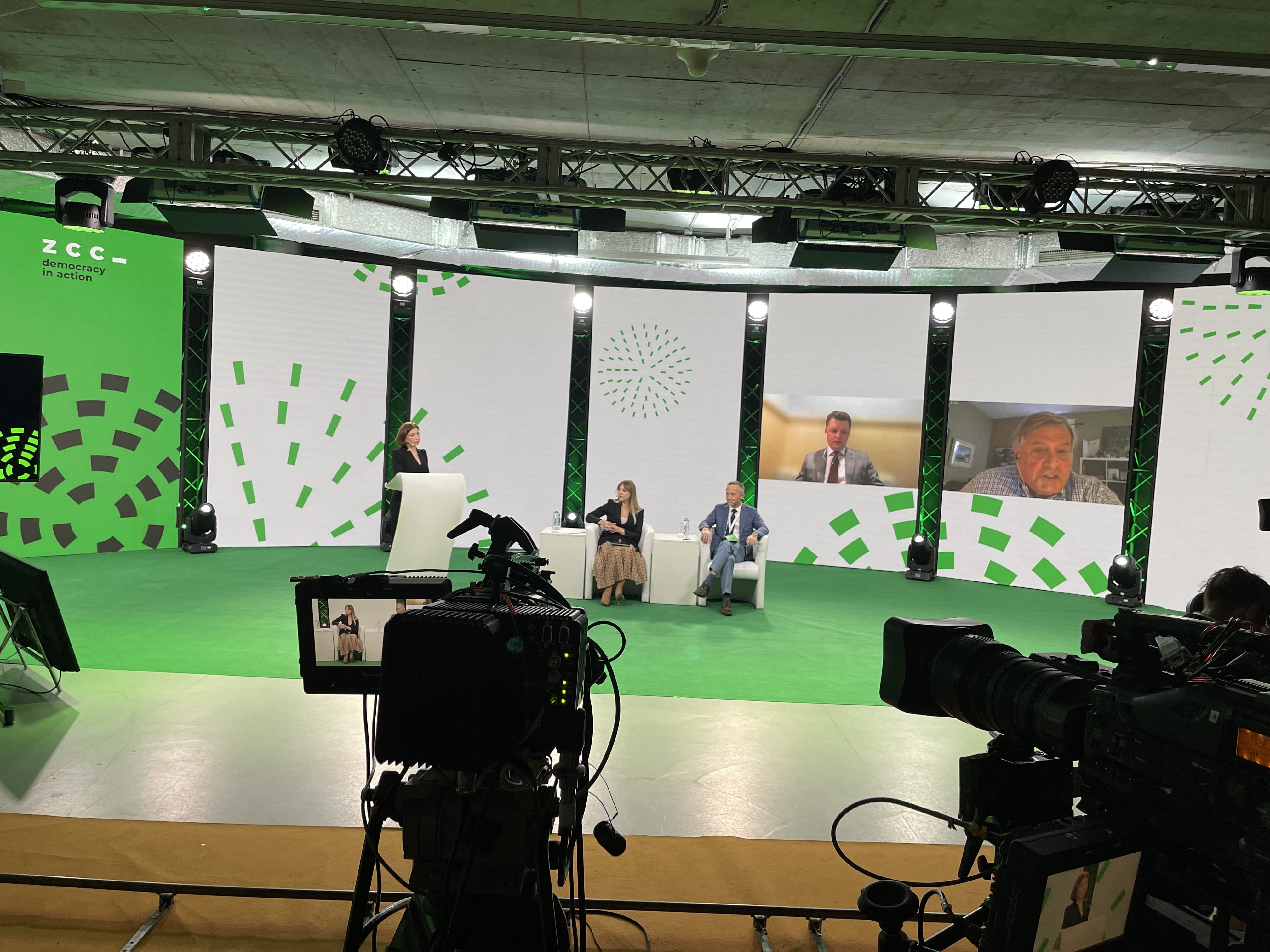On June, 7-8, the Democracy in Action conference took place. During the discussion on “Ensuring Sustainable Democracy Through Elections: Prospects and Challenges” event participants discussed global solutions for the development of democracy and elections. Civil Network OPORA co-organized the conference.
According to Olha Aivazovska, the discussion moderator, and chair of the board at the Civil Network OPORA, said democracy shall be on a daily basis, especially in-between the elections.
“Democracy is not a status, but rather a process of becoming. We need to fight for it on a daily basis, especially in-between the elections. Global trends show a very rapid shift from transitional democracies to authoritarian systems of government. Whenever a society with no long history of democratic elections I loyal to certain facts of violations of rights and freedoms, sooner or later the process may come to a point of no return and painful. Elections are often a maturity marker for citizens and political elite. It is also a sign for the citizen capacity to actively and timely respond to it,” says she.
Chairperson of the National Endowment for Democracy (NED), Kenneth Wollack, said that elections are undervalued by many. Even the authoritarian regimes hold elections although they strive to recognize the preliminary election results.
According to him, democratic elections embody very different political and human rights agreements, they consolidate the approach that the state sovereignty is owned by the people of the country.
“Therefore, elections are organized to pay respect to the will of the people about candidates who shall hold certain office and exercise governance in the interests of the people. That is why it is ironic that most autocratic regimes that manage elections for their benefit are also signatories to various international documents. The challenges they face to actually administer elections is a different matter. Because elections are important as they show best how government treats their citizens and respects them. That is why they reflect on how each democratic institution functions. In addition to authorities administering the elections, the institutions include such branches of power as executive, legislative, and the judiciary. Similar to security authorities, there is mass media, political parties, and civil society. Therefore, elections present a stress-test for each institution in free society. It is also a trial for the agreement between citizens and the government representing them. The first principle of democratic elections is their inclusivity. It means that the citizens shall be able to exercise their suffrage if they are willing to do so. The same goes about those who wish to be elected. According to this principle, a legal framework shall be chosen, voter register shall be developed, requirements for candidates shall eb set, the electoral race shall be organized, and voting capacity shall be ensured. Second principle is about transparency – when the process around elections shall be open for the public and for monitoring. It is about the freedom to search for information and receive it. It is the right to receive knowledge and opinions to build your own will, and for election participants – to have them freely interact with the public. It is also about the capacity of the media to communicate and support public debate related to elections. Thus, election participants shall be provided with information about electoral procedures for voters, so that they could exercise their respective rights. Transparency also includes the capacity of election participants, mass media, and civil society to observe, check the transparency of the campaign, vote count, and voting results. Principle three is about accountability. Eventually, inclusivity, transparency, and accountability – all the three principles – are brought together to increase trust of the people to elections, to parties, to election administration authorities, to the judicial system, law-enforcement, and the media. It all builds the government’s legitimacy. It is important to know that many protest movements (or revolutions, in some places) actually break out not because of political or economic reasons, but especially because of faked elections. Ukraine’s experience over the past two decades well illustrated it,” he said.
Senior adviser of the International Foundation for Electoral Systems (IFES), IFES director in Ukraine, Peter Erben quoted the findings of The Economist survey and said that Ukraine showed significant progress in electoral reform.
“Some countries have a lengthy process of democratic transformation, others have a long-standing democratic tradition. That is why we need to consider the data and be reminded of the hug responsibility we face. Despite the political challenges and the undergoing conflict, despite the occupation and the pandemic, from an international perspective, Ukraine has managed the electoral reform quite well. In terms of some important data that reflect the situation in the international community, Ukraine disposed of the Central Election Commission of Yanukovych’s time, and created a new election commission. It is young and strong. It cooperates with various stakeholders, such as the international community, Verkhovna Rada, and civil society – to ensure fair elections in Ukraine. Ukraine rejected outdated election regulations and introduced new rules for the conduct of elections. They bring Ukraine closer to European and international standards. In 2019-2020, Ukraine held elections that have been considered by far the best in Ukraine’s history. Peaceful transition of power took place, from one President to another. Although The Economist said that 2020 was bad for democracy all over the world, we can see a statement of the European Parliament that recognized Ukraine’s significant progress made. On the other hand, democracy faces challenges globally, but Ukraine keeps advancing in the elections. There is certainly much work to be done to take the reform further. International community needs to take a deep breath and admit that much progress has been made, they shall admit the electoral reform in Ukraine. It reminds that Ukraine is a country that is able to reach democracy and sustain it. It is important to have Ukraine’s electoral progress inspire millions of people who walk out to the streets in Belarus, Russia, and Myanmar. It is also a success story that autocrats fear because they start fearing their own citizens. Ukraine is a beacon for many other countries striving to improve electoral situation back home. Many more challenges remain: we would like to improve the representation in political parties, we need to keep updating the elections institution by introducing the 5-year strategic planning, we need to introduce a better legal framework and conduct better elections in 2023,” Peter Erben said .

Special representative of Belarus presidential candidate, Svitlana Tikhanovska, on elections, Oleksandr Shlyk, expressed his expectations that the crisis in Belarus could be solved only through democratic methods, and the methods shall be used to build a democratic country. That is why elections will be the only way to come out of the current crisis. Ukraine can set a model on that, to a certain extent.

“I think that the struggle underway in Belarus since last August, and that had been there before – it is a very long fight because we are striving to find peaceful democratic solutions for the current crisis. I am deeply convinced that we will be able to resolve the crisis in Belarus through democratic methods only. These methods will help us build a new democratic state. I think that in light of global trends, I can have high expectations for the future of my country of Belarus. I can see that elections in the world are getting more fair status. However, if we view the situations taking place 20 years ago (actually, I used to work as an international observer at elections), many technical issues have been resolved by now. Today, though, we see the situation when politics is deeply involved in electoral process. We need to address it at each election. That is why I believe we shall not expect elections to be a moment of national unification that will make everyone happy. Not at all. Elections are the only peaceful way to resolve the conflict in society, whether we like it or not. That is why, in Belarus, we insist that elections be the only way to get out of the current crisis. I am well aware of the road that Ukraine had to take to reach democracy, and also how hard it was. Propaganda in Belarus and in other countries keep saying: you want democracy to result in what happened in Ukraine? They list the challenges that Ukrainian has been facing for several years now, and propaganda has it as something horrible. However, the progress Ukraine has made, especially in the context of electoral reform, reassures many people in my country to say: “yes, we do, we would actually like to have it like in Ukraine, at least in terms of elections. That is why we, in Belarus, should remember that the fight for democracy has no borders. When Ukrainians walk out to the streets, as they did several years ago, they also did it for their neighbouring states. Since Belarus people protest and keep fighting, they are doing it to maintain democracy, but not only in their own country. They are doing it for the sake of principles we all share, that are shared for everyone willing to get a better future for us and our children,” he said.
 Alina Zahoruyko, a people’s deputy, chair of the Commission for elections and referenda of the Verkhovna Rada Committee on the Organization of State Power, Local Self-Government, Regional Development and Urban Planning, highlighted civil society and international organizations that shape public opinion and impact decision making, and that are indispensable for political regime.
Alina Zahoruyko, a people’s deputy, chair of the Commission for elections and referenda of the Verkhovna Rada Committee on the Organization of State Power, Local Self-Government, Regional Development and Urban Planning, highlighted civil society and international organizations that shape public opinion and impact decision making, and that are indispensable for political regime.
“I would like to start with the origins, with the history, and more specifically – to political science that defines democracy as a political regime. One such classic political scientists, a Canadian David Easton, defined political regime as a set of formal and informal structures. The structures function, interact among each other, make certain decisions to be later implemented into life. Indeed, formal institutions are important to have. For example, having multi-party elections when more than one party participates in elections. It can really be referred to the treasures of democracy however does the presence of the formal institutions imply the democratic regime. Not really, not always. Why is this happening – because along with the formal institutions, we also have the informal institutions, some of them even disrupting. Corruption is one such phenomenon, widely mentioned before. Whenever I say “corruption” I do not mean the bribery per se, but also many other phenomena: nepotism, favoritism, and other such things occurring at the early stages of democracy building. However, with formal and informal institutions, the political regime cannot be possible without a key element: without the actors. I refer to the people who are opinion leaders, who impact decision-making. Here, I would like to highlight such key actors as civil society and international organizations. Some of them show to us best practices, perfect cases, and standards; others help us aggregate it all into life. CSOs advocate for the necessary change, legislators implement them into life. In this context, in the map of Ukraine, let me remind that this year we celebrate the 30th anniversary of Ukraine’s independence. We took this road in a dynamic fight for democracy. I would also mention the three revolutions we had: The Revolution on Granite, Orange Revolution, and the Revolution of Dignity. These events contained the spread of an autocratic regime. They showed that Ukraine had a proactive civils society capable of producing impact and the processes. One such example to mention is the improvement of Electoral Code which changes empowered Ukraine to score 8.25 of the maximum 10 in a category “Electoral Processes and Pluralism” administered by The Economist. Certainly, elections are not the only aspect that contribute to the high score but this small component is a contribution to Ukraine’s advance in general,” says she.
The deputy also called upon all stakeholders to enter a constructive dialogue as it is the only source that gives hope to move democracy upscale.
Read more about the conference and partners.
